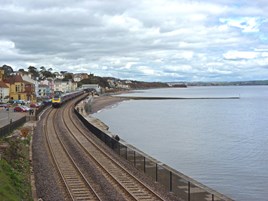Network Rail’s Western Route Managing Director Mark Langman has re-pledged NR’s commitment to making the coastal route at Dawlish more resilient.
In an exclusive interview with RAIL, Langman said that NR does not have a preferred plan at the moment for defending the line from bad weather and the effects of climate change, but that it would be sufficiently protected to “remain there in our lifetimes”.
His comments come more than nine months since NR published its Exeter to Newton Abbot Geo-Environment Resilience Study Executive Summary for Winter 2016-17 (RAIL 815), which offered five coastal defence options and six geo-technical options that are designed to prevent any re-occurrence of the infamous sea wall failure in February 2014. The line was closed for two months for repairs.
Increased resilience is also needed to mitigate the risks posed by a projected sea level rise of up to 55cm by 2065.
Coastal defence options include extending the sea wall further out to sea, raising the height of the sea wall, and using beach management techniques such as groynes and offshore breakwaters. Geo-technical options identified by the study include re-grading the surrounding cliffs to reduce their gradient, improving drainage, and extending existing rock fall shelters to reduce the risk of rock fall disrupting operations.
The overall investment outlined in the strategy was more than £600 million, but NR said that some interventions should be prioritised for delivery in Control Period 6 (2019-24), while others could be deferred. The study was sent to the Department for Transport to decide on the best course of action and to find funding.
Meanwhile, the Government has provided £10m to NR for further development of its short, medium and long-term plans, to protect the railway before any plans are put to public consultation.
- Mark Langman's quotes, and the full story, appear in RAIL 835, out now on the Android/iPad, or on the shelves September 13.















Comment as guest
Comments
Richie - 09/09/2017 15:50
As a member of the orange army that re-constructed the new wall and rail after the infamous collapse, extending the wall out further into the sea would spoil the character of the route, yet installing breakwater defences out at sea and also securing the cliffs is a great and much needed idea. About time.!!!
Reply as guest
Alistair Kewish - 09/09/2017 21:25
In retrospect, it was a huge mistake to route Mr Brunel's railway alongside the sea at Dawlish Warren. The greater irony being that the former, inland railway route suffered from frequent flooding. It is still viable to suggest reopening the Heathfield route. I was resident in Devon between 1997-99 and witnessed the severe flooding in the Exeter area. There is no long term solution to the problem and global warming will continue despite all our preventive measures.
Reply as guest
Everton richards - 10/09/2017 17:01
Would imagine the type & levels of coastal & line protection would be considered on cost basis, But at the end of the day, whichever system is put in place,, will there be an honest, open pledge that the main criteria used in making the choice is one based on the effectiveness of system to be used as opposed to the cost,, Saying goes "you get what you pay for...!" Please do not make a choice that will necessitate a later apology or future loss of life because of concern regarding cost.
Reply as guest